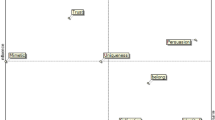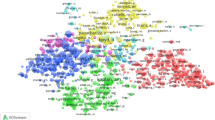Abstract
There is a popular notion that social media is a detrimental force in modern society. Previous research has often examined social media from a perspective of dysfunction as opposed to investigating more positive aspects of human functioning. To better investigate positive human functioning, the current research adopts a psychological wellbeing perspective to focus on Instagram, a largely image-based form of social media, and how Instagram might be related to a self-reported ability to flourish (flourishing) and subjective feelings of wellbeing (i.e., feeling positive emotions and negative emotions). A sample of 295 undergraduate students (M age = 20; SD age = 3.34; 265 females and 30 males) completed questionnaire-based measures over an online research platform examining time spent on Instagram, Instagram activities, social comparisons and psychological wellbeing. Self-reported time spent on Instagram a day was not associated with any of the three psychological wellbeing measures. But how people used Instagram was related to psychological wellbeing. Using Instagram to interact with others was positively associated with both flourishing and positive emotions, whilst browsing on Instagram was positively associated with positive emotions. Furthermore, making downward comparisons whilst using Instagram was associated with positive emotions. Conversely, making upward comparisons when using Instagram was negatively associated with flourishing and positive emotions and positively associated with negative emotions. Overall, the research would suggest that using Instagram is not always associated with detriments to wellbeing. But rather, how people use Instagram can be associated with either higher or lower self-reports of psychological wellbeing.
Similar content being viewed by others
References
Diener, E., Wirtz, D., Tov, W., Kim-Prieto, C., Choi, D. -W., Oishi, S., & Biswas-Diener, R. (2010). New well-being measures: Short scales to assess flourishing and positive and negative feelings. Social Indicators Research, 97(2), 143–156. https://doi.org/10.1007/s11205-009-9493-y
Fioravanti, G., Prostamo, A., & Casale, S. (2019). Taking a short break from Instagram: the effects on subjective well-being. Cyberpsychology, Behavior, and Social Networking, 23(2). https://doi.org/10.1089/cyber.2019.0400
Gudka, M., Gardiner, K. L. K., & Lomas, T. (2021). Towards a framework for flourishing through social media: A systematic review of 118 research studies. The Journal of Positive Psychology. https://doi.org/10.1080/17439760.2021.1991447
Keyte, R., Mullis, L., Egan, H., & M., Cook, A., & Mantzios, M. (2021). Self-compassion and Instagram use is explained by the relation to anxiety, depression, and stress. Journal of Technology in Behavioral Sciences, 6, 436–441. https://doi.org/10.1007/s41347-020-00186-z
Lup, K., Trub, L., & Rosenthal, L. (2015). Instagram #Instasad?: Exploring associations among Instagram use, depressive symptoms, negative social comparison, and strangers followed. CyberPsychology, Behaviour and Social Networking, 18, 241–251. https://doi.org/10.1089/cyber.2014.0560
McCrae, N., Gettings, S., & Purssell, E. (2017). Social media and depressive symptoms in childhood and adolescence: A systematic review. Adolescent Research Review, 2, 315–330. https://doi.org/10.1007/s40894-017-0053-4
Pittman, M., & Reich, B. (2016). Social media and loneliness: Why an Instagram picture may be worth more than a thousand Twitter words. Computers in Human Behavior, 62, 155–167. https://doi.org/10.1016/j.chb.2016.03.084
Quinn, S. (2019). Positive aspects of social media. In A. Attrill, C. Fullwood, M. Keep, & D. J. Kuss (Eds.), The oxford handbook of cyberpsychology (pp. 413–431). Oxford University Press.
Rodriguez, S. (2021). Instagram surpasses 2 billion monthly users while powering through a year of turmoil. CNBC. Retrieved from: https://www.cnbc.com/2021/12/14/instagram-surpasses-2-billion-monthly-users.html
Schmuck, D., Karsay, K., Matthes, J., & Stevic, A. (2019). “Looking up and feeling down” the influence of mobile social networking site use on upward social comparison, self-esteem, and well-being of adult smartphone users. Telematics and Informatics, 42, 101240. https://doi.org/10.1016/j.tele.2019.101240
Seligman, M. E. P. (2013). Flourish: A visionary new understanding of happiness and well-being. Free Press.
Sherlock, M., & Wagstaff, L. D. (2018). Exploring the relationship between frequency of Instagram use, exposure to idealized images, and psychological well-being in women. Psychology of Popular Media Culture, 8(4), 482–490. https://doi.org/10.1037/ppm0000182
Trifiro, B. M., & Prena, K. (2021). Active Instagram use and its association with self-esteem and well-being. Technology, Mind, and Behavior, 2(3). https://doi.org/10.1037/tmb0000043
Vogel, E., Rose, J., Roberts, L., & Eckles, K. (2014). Social comparison, social media, and self-esteem. Psychology of Popular Media Culture, 3(4), 206–222. https://doi.org/10.1037/ppm0000047
Yang, C. -C. (2016). Instagram use, loneliness, and social comparison orientation: Interact and browse on social media, but don’t compare. Cyberpsychology, Behavior, and Social Networking, 19(12), 703–708. https://doi.org/10.1089/cyber.2016.0201
Author information
Authors and Affiliations
Contributions
All the authors contributed to the study conception, design, and material preparation. Data collection and analysis were performed by Roshan Rai and Mei-I Cheng. The first draft of the manuscript was written by Roshan Rai, and all the authors commented on previous versions of the manuscript. All the authors read and approved the final manuscript.
Corresponding author
Ethics declarations
Ethics Approval
This study was performed in line with the principles of the Declaration of Helsinki. Approval was granted by the Ethics Committee of University B (Date 2.10.2020/No 3654).
Consent to Participate
Informed consent was obtained from all individual participants included in the study.
Competing Interests
The authors declare no competing interests.
Additional information
Publisher's Note
Springer Nature remains neutral with regard to jurisdictional claims in published maps and institutional affiliations.
Rights and permissions
About this article
Cite this article
Rai, R., Cheng, MI. & Scullion, H. How People Use Instagram and Making Social Comparisons Are Associated With Psychological Wellbeing. J. technol. behav. sci. 9, 204–210 (2024). https://doi.org/10.1007/s41347-023-00319-0
Received:
Revised:
Accepted:
Published:
Issue Date:
DOI: https://doi.org/10.1007/s41347-023-00319-0




